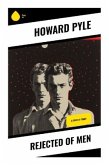In "Rejected of Men," Howard Pyle weaves a poignant narrative that captures the struggle of marginalized individuals facing societal rejection. Set against the richly textured backdrop of American life in the late 19th to early 20th centuries, this work employs a lyrical yet accessible literary style, blending realism with evocative imagery that highlights the characters' emotional landscapes. Pyle's adept storytelling reveals the complexities of human relationships and societal values, exploring themes of dignity, identity, and resilience in the face of adversity, making this novel a notable contribution to American literature of its time. Howard Pyle, an influential American illustrator and author, is celebrated for his ability to combine art and narrative, which undoubtedly informed his storytelling in "Rejected of Men." His experiences as a teacher and his deep engagement with the arts shaped his understanding of character and social dynamics, while his interest in folklore and adventure imbued his stories with imaginative depth. This book reflects Pyle's commitment to social commentary and his empathy toward the disenfranchised, rooted in a broader cultural discourse of his era. This compelling work is highly recommended for readers interested in early American literature and those who appreciate character-driven narratives that grapple with profound social issues. Pyle's rich prose and empathetic storytelling provide valuable insights into the human condition, making "Rejected of Men" a timeless exploration of resilience and the quest for acceptance.
Bitte wählen Sie Ihr Anliegen aus.
Rechnungen
Retourenschein anfordern
Bestellstatus
Storno








